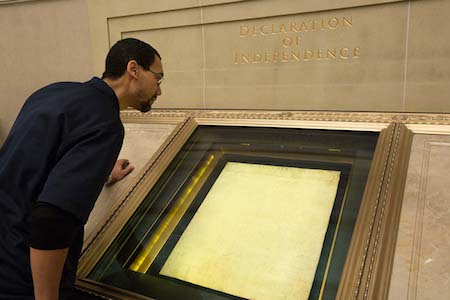I was recently talking to a friend who moved from Israel to America about 30 years ago. He’s been building a career, raising a family — basically living the American dream. He said that one of the reasons he wanted to come here was that he grew up hearing about ‘American exceptionalism’.
ICYMI: What Will Biden Do When He Finds Out?
But the more he looks around, the more he finds himself asking whether Americans are exceptional because they seem to be just like everyone else.
I told him that it’s not the people of America who are exceptional. It’s the ideas of America that are exceptional.
To take just one example — where else, and at what other time, has a government been created for the express purpose of protecting the rights of the people who formed it?
(Not to keep them safe, or ensure equitable outcomes, or spread their influence throughout the world. Not to carry out the will of a deity, or the will of the majority, or the will of a small group of leaders. To protect rights that already existed prior to the government itself.)
To take another example — where else, and at what other time, has a government been created with the idea that people must consent to the laws they are expected to obey? That laws are something you embrace because you created them, rather than something to try to get around because someone else is trying to use them to control you?
If those aren’t exceptional ideas, I don’t know what is.
However the people of America are sort of like trust fund kids, who squander an inheritance they didn’t create, and so don’t really understand or appreciate.
When you leave a lot of money or property to people who didn’t earn it, in most cases it doesn’t end well. The heirs often see the legacy as something to be spent on what they want now, rather than as something to be preserved, and even increased, for future generations. They squander it on luxuries — cars, boats, houses, landscaping, furniture, vacations, haircuts, shoes, and so on.
A similar thing happens when you leave a legacy of political principles based on rights and consent to people who didn’t create and fight for them, and don’t actually understand them. They see the legacy as something to be used to get what they want now, rather than as something to be preserved, and even enhanced, for future generations. They squander it on government monopolies, interference in the affairs of other nations (to say nothing of businesses and individuals in our own country), prisons to punish people who disagree with their moral preferences, agencies to punish people who disagree with their economic preferences, benefit checks to retired millionaires, and so on.
That’s the bad news. The good news is that, unlike money, which is gone once it’s spent, political principles hang around even if they’re not being used. We could, if we wanted, pick them up, dust them off, and use them to start again. All we have to do is choose to do that.
But the other bad news is that people often make such a choice only when they’ve hit rock bottom. The Declaration of Independence acknowledges this: all experience hath shewn, that mankind are more disposed to suffer, while evils are sufferable, than to right themselves by abolishing the forms to which they are accustomed.
But the other good news is that after watching the first presidential debate of 2020, it looks like there’s not much room left to fall before reaching rock bottom.
